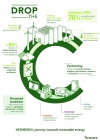
Athenian Brewery S.A.
Member: Silver
Since: 27.03.2009
Since: 27.03.2009
107, Kifissou Avenue, GR-122 41 Egaleo, Athens, Greece
Athenian Brewery: New Science-Based Goals, Carbon Pricing Scheme to Help Heineken ‘Drop the C’
14.02.2018
Share

Heineken has unveiled a new sustainability strategy that will see the brewer increase renewable energy production, set science-based targets across distribution, cooling and packaging, and pilot an internal carbon pricing scheme.
Heineken’s Drop the C program aims to grow the company’s share of renewable thermal energy and electricity production from 14 to 70 percent by 2030. This implies an 80 percent reduction target in carbon emissions compared to the 2008 base year. During 2017, Heineken identified a number of projects that will contribute to the achievement of its 2030 ambition. The targets will be externally verified by the Science Based Targets initiative.
“With all the good progress made in reducing our CO2 emissions, now is the right time to set ourselves new targets. When I visit our breweries, I want to see that we are brewing with real green energy and that we are not achieving our reduction targets by buying unbundled certificates,” said Jean-François van Boxmeer, Chairman and CEO of Heineken.
“Beyond production, distribution and cooling, we are also going to take a close look at our packaging, because it represents a significant portion of our carbon footprint. Packaging is an area where reductions will be harder to achieve because we simply cannot do this alone. We invite our business partners and others to work with us to reduce emissions across our business.”
Heineken’s energy footprint in production is driven by thermal energy (Scope 1 of GHG Protocol), which it uses to heat the boilers needed for brewing and by the electricity needed for the production process (Scope 2 of GHG Protocol). The split of this energy mix is 70 percent thermal and 30 percent electricity.
The company has already made inroads to renewable electricity by using solar and wind energy. Its brewery in Massafra, Italy is one of the largest solar-operated breweries in the world with a capacity of 3.3 MW, while its Göss, Austria brewery is carbon neutral. Heineken breweries in Singapore and the Netherlands are also using solar power and wind energy. Currently, 29 percent of Heineken’s global electricity usage is renewable.
Seven percent of the thermal energy used by Heineken is powered by biomass and biogas. The company says that making progress in this area is much more difficult to achieve than on the electricity side. Renewable thermal energy is often self-produced and needs to be reliable to keep the breweries running. There are also very few commercial solutions available in many of the markets in which Heineken operates, including Africa, Asia and Latin America.
However, the company has begun experimenting with how unproductive waste from local communities can be turned into energy and provide income for local people. In Vietnam, Heineken sources rice husks from local farmers to heat its brewing boilers. In Brazil, a new biomass boiler was fired up in 2017 at the company’s brewery in Ponta Grossa, solely using woodchips from certified reforestation companies.
As part of its 2030 targets, Heineken will continue to promote reforestation projects in Mexico, Spain and Indonesia to offset carbon emissions and support water preservation. Internally, the company will start piloting Carbon Shadow Pricing to help drive sustainable investment and innovation decisions.
Source: sustainablebrands.com








.jpg)





.jpg)








1.jpg)








.jpg)






1.jpg)


.jpg)





















1.jpg)







1.jpg)



1.jpg)
.jpg)
.jpg)



















